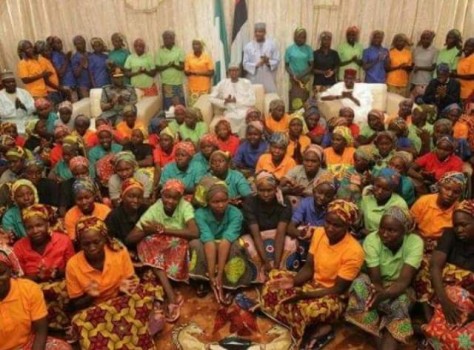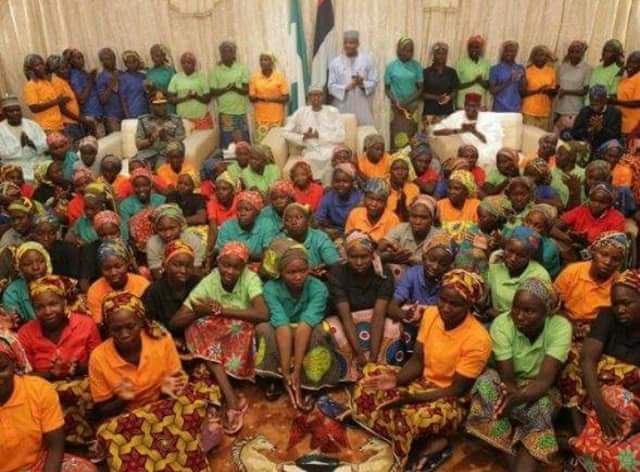How can we overcome crises in the north east?

The release of 82 more pupils of the Chibok Girls Secondary School on May 7, is a welcome development. Working-class people must however not be fooled by the federal government’s strategy of making political capital out of this. There are still 113 of the “Chibok girls” in captivity and thousands more from several abductions in the region. And despite the government’s claim that it has defeated Boko Haram, the sect’s activities have resumed with vengeance over the last couple of months.
The release of the 82 pupils was the result of several months of negotiations with Boko Haram involving a swap of the pupils for 5 Boko Haram leaders. Mr. Mustapha Zanna, who was the lawyer of Mohammed Yusuf, the Boko Haram founder whilst he was alive, helped facilitate the deal, with the International Red Cross and the government of Switzerland providing technical support.
It is however worrisome that it took the APC government almost two years to realise it needed to negotiate with Boko Haram to secure the release of first, 21 girls six months ago, and subsequently the 82 girls. Shortly after the abduction of the 276 pupils in 2014, Socialist Worker asked the question “how can the Chibok students be freed?”
As we acknowledged the “commendable courage” of the pupils, out of whom over 50 became free by taking their fate into their hands, we also provided the answer which took different sections of the bosses’ class (PDP and APC alike) three years to grasp.
“To ensure that all the students return home safely, the government has to negotiate with Boko Haram. Even the United States government, despite all its talk about not negotiating with terrorists, recently released five suspected Taliban members from Guantanamo Bay to secure the release of one American soldier” (Socialist Worker, June/July 2014).
We also went beyond that in presenting “a bigger picture of terror”, pointing out that “the growth of Boko Haram, was fuelled by the prevalence of abject poverty, rampant unemployment, and utter disillusionment, for poor people, while the politicians and other rich bosses live in luxury, and wallow in corruption.” Eventually, the federal government grudgingly came to the same conclusions.
This understanding was supposed to be the basis for setting up the Presidential Initiative for the North East (PINE), 2015 – 2020. But, the Shehu Sani-led Senate committee on the Initiative revealed massive fraud. The “grass-cutter” scandal of the suspended Secretary to the Government of the Federation, Mr Babachir Lawal is just a tip of the iceberg.
Mr. Lawal awarded contracts worth more than N500m through the initiative, using five companies to pocket at least N270m from this. There were more than 20 other companies awarded contracts that cannot be traced according to Shehu Sani. And all these goes on while poverty continues to be on the rise in the region and Internally Displaced Persons camps like that in Banki were the pupils were left by the sect, continue to swell, with almost a 100,000 people who fled into Cameroon at the peak of the conflict, returning.
For the ACP, its welcome but belated action in getting the 82 students released is mainly aimed at building up its falling support. But, as Amnesty International noted, these young women do not “deserve to be put through a publicity stunt” by the government. In a similar vein, Nigeria Labour Congress has chided the APC government, asking that it should “stop playing politics with Chibok girls.”
During his inauguration two years ago, President Buhari declared that “we cannot claim to have defeated Boko Haram without rescuing the Chibok girls and all other innocent persons held hostage by insurgents.” There have been at least 41 reported cases of mass abductions over the last three years alone, with between 2,000 and 4,000 persons kidnapped. Thus, successes of the Nigerian Army in its war against Boko Haram rang hollow.
The Chibok abduction attracted great attention and relentless campaign to “bring back our girls”. Thus, the recent releases are being seized upon by the government as a means to win goodwill under the pretence of progress being made to overcome the violent crises in that region.
Making progress in the North East however requires working-class people to be the driving force of transformative initiatives. Trade unions, community-based associations, civil society organisations, professional bodies etc. must be central in decision-making, including for the rehabilitation of the freed Chibok pupils and the formulation and implementation of development projects.
Self-defence bodies like the Civilian JTF have to be organised by more communities, and as bodies independent of the armed forces who are responsible for as much if not more deaths in the region, as Boko Haram.
NLC and TUC as well as radical civil society organisations have to rise up to the challenge of providing leadership which holds the government responsible and goes beyond this. Organised labour must ensure that poor working-class people who bear the burden of the war in the North East, including the loss or abduction of loved ones, take their fate in their hands, in the struggle for peace, justice and our self-emancipation.
by Yusuf Lawal









